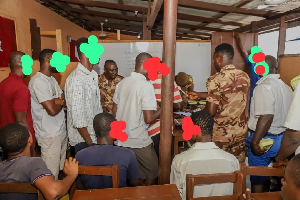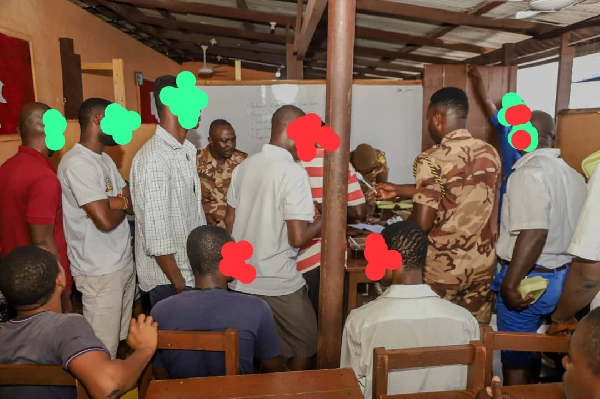 The Ghana Prisons Service
The Ghana Prisons Service
The Sustainable Development Goal 4 is to: “Ensure inclusive and equitable quality education and promote lifelong learning opportunities for all.” The SDG 4 aims to transform global education systems by 2030. Prison inmates who are willing, mentally, and medically fit to study, and have conducted themselves well, and also with more than 4 years to spend in prison are given the golden opportunity to equitable and primary education and also promote Equal access to technical/vocational, and higher education imbibed with employable skills that prepares them for the world outside the walls of the prison. The Ghana Prisons Service is particular about Target 4 of the SDG which talks about Inclusion and Equity.
The Jackson College of Education in collaboration with the Manhyia Local Prison, backed by the SDG 4 and the Nelson Mandela Rules, rolled out a 4-year Bachelors of Education program at the Manhyia Palace based prison facility in 2023 with 9 inmates who are currently in their 2 nd year doing marvelously well.
The progress of the initiative at the Manhyia Local Prison, have made it possible for the same to be commenced at the Kumasi Central Prison come September 2025. At the Kumasi Central Prison, the school intends to start with 10 inmates due to the limited space at the ICT lab and inadequate computers; since the programme is largely an online type.
Jackson Educational Complex
The Jackson College of Education (JCE) is the teacher education division of the Jackson Educational Complex (JEC) in Kumasi. It was established in the year 2009 by Prof. Ebenezer Asafua Jackson and Mrs. Theodosia Wilhelmina Jackson, both astute and celebrated educationists, who had spent over forty years each, as teachers in second cycle and tertiary educational levels respectively. The College of Education started with three (3) learning centres but now has 31 learning centres in 13 regions across the country.
The College of Education was the first Private College of Education in Ghana to run a 3-year Diploma Programme in Basic Education through Distance Learning.
Currently, it runs a 4-year Bachelor of Education programme, a 2-year Top-Up to Bachelor of Education (Post Diploma) programme and Post Graduate programmes.
Education Behind Bars
The Jackson Educational Complex’s decision to consider prison inmates in their educational programmes stems out of from their support of the United Nations Standard Minimum Rules for the Treatment of Prisoners.
Rule 104 of the Nelson Mandela Rules states that:
1.The United Nations Standard Minimum Rules for the Treatment of Prisoners. (the Nelson Mandela Rules) states that, provision shall be made for the further education of all prisoners capable of profiting thereby including religious instruction in the countries where this is possible. The education of illiterate prisoners and of young prisoners shall be compulsory and special attention shall be paid to it by the prison administration.
2.So far us practicable, the education of prisoners shall be integrated with the educational system of the country so that after their release they may continue their education without difficulty.
In line with the UNSMR for the treatment of prisoners, the Ghana Prisons Service have, regardless of its logistical constraints, over the years done its best to train illiterate inmates and literate ones in formal education ranging from Adult Education, Basic education, Senior High, and tertiary education.
The administration of the Jackson Educational Complex sees this educational initiative as a rehabilitative tool to reduce recidivism and stigmatization. An educated prisoner who gets discharged will be accorded a higher level of respect and also have higher chances of reintegrating and acquiring a job faster.
The school is supporting the Ghana Prisons Service to go beyond warehousing of prisoners to reforming and rehabilitating inmates who are ready to make a difference after incarceration.
Teaching Modules
The scope of facilitation will be a blend of face-to-face and online synchronous lectures augmented by recorded lecture videos (asynchronous) serves as the teaching methodology.
The synchronous lectures are streamed from the Jackson University College head office to them during lesson hours at their premises. In addition, all lessons are recorded and made available to them at a given schedule prepared by the prison administration for the students.
Peer assisted learning or Group studies are implemented for constant discussion to engage in collaborative inquiry, share best practices, and solve common challenges or problems. All the course modules needed for each semester will be printed and handed over to the students to assist them in their studies.
These modules have been developed by the institution to provide structured and comprehensive educational course content for students. They are designed to give details on the key concepts, objectives, and learning outcomes associated with each topic or theme.
The well-prepared Modules serve as supplemental learning materials to reinforce concepts covered in classroom lectures. Incarcerated students access the modules at their own pace, revisit key points, and clarify any areas of confusion or difficulty, explore topics of interest, and deepen their knowledge on specific subjects thereby enhancing their understanding and master Assessment.
All assignments will be in-person (paper and pen) form. Examinations are conducted following the examinations code of conduct of the university. Examinations supervisors and the prison management carry out the necessary supervision during examinations.
Mathematical sets, calculators and any other tool needed during examinations are always made available to the inmate candidates.
The Degree is awarded by the University of Education, Winneba (UEW). Inmates will be graduated
Philanthropic Activities to the Ashanti Regional Prisons Command
Prior to rolling out the Bachelor’s Degree programe, the Jackson family have been one of the few philanthropic groups who have been consistent with supporting inmates food ration, providing construction and renovation works, supporting chaplaincy with public address systems among others across most of the prison establishments in the Ashanti region’ specifically the Kumasi Central, Manhyia Local and the Kumasi Female Prisons, dating back to 2018.


